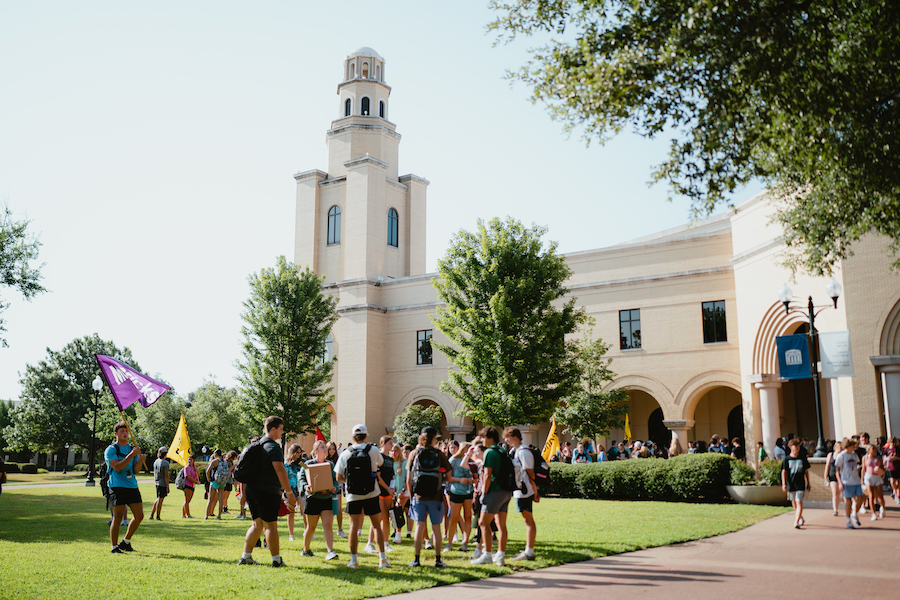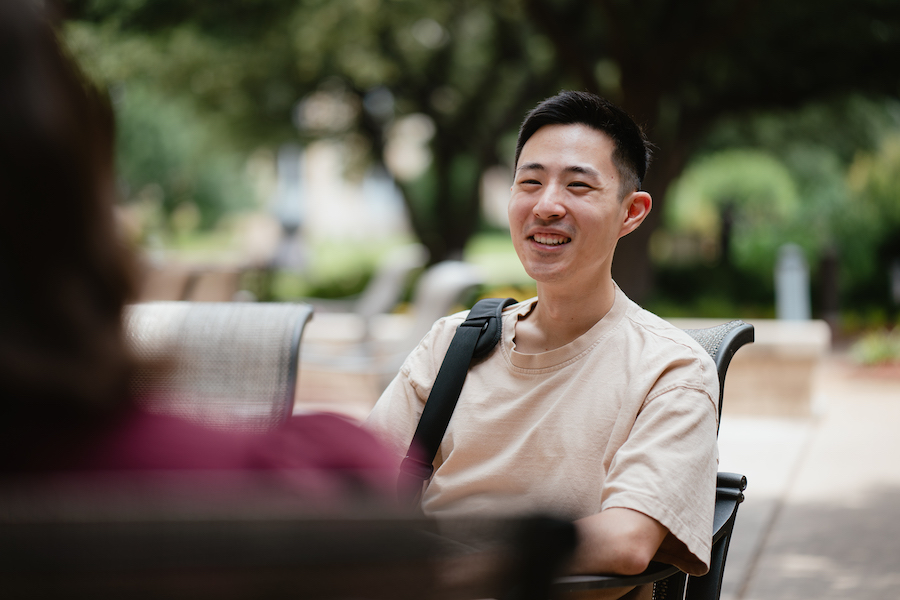Coach-in-Chief: Distinguished Baptist theologian David S. Dockery leads Southwestern Seminary with the heart of a coach
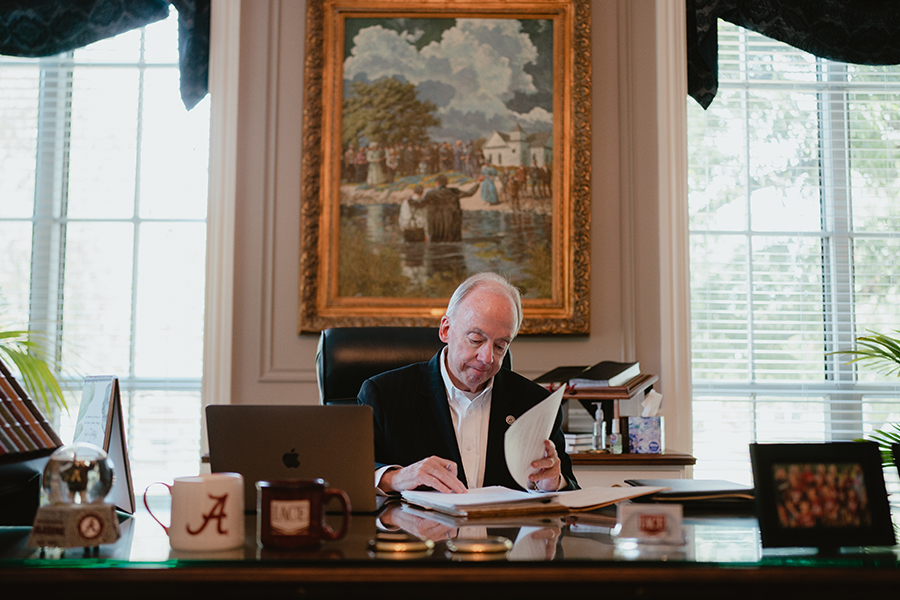
Editor’s note: This article originally appeared in the Fall 2023 issue of Southwestern News.
When David S. Dockery (‘81) describes what his career aspirations were as an eight-year-old boy growing up in Birmingham, Alabama, his entire face lights up.
“I always wanted to be a sports journalist,” recalls Dockery, the tenth president of Southwestern Baptist Theological Seminary. “I grew up loving sports – any kind, every kind.”
Dockery would listen to ballgames, including the Atlanta Braves and the University of Alabama football and basketball games, on “my little transistor radio,” he says, moving his hand to his right ear to demonstrate how he would tune in to the games. The elementary-aged Dockery would use his tape recorder to see if he could repeat what he heard as he would “broadcast the game to myself,” he remembers.
“I was either going to be a coach or a sports broadcaster,” the future Baptist theologian says. “My life was filled with sports and that was the direction that I was going.” Dockery adds he “dreamed” about going into sports “all my life,” and as a high schooler would broadcast the junior high ball games from the press box.
Dockery’s love of sports would lead him to the University of Alabama, where he would study on a full athletic scholarship – not as an athlete on the field, but as a student worker in the university’s athletic department. As part of the Crimson Tide’s athletic team, Dockery has an SEC championship ring that he still often wears.
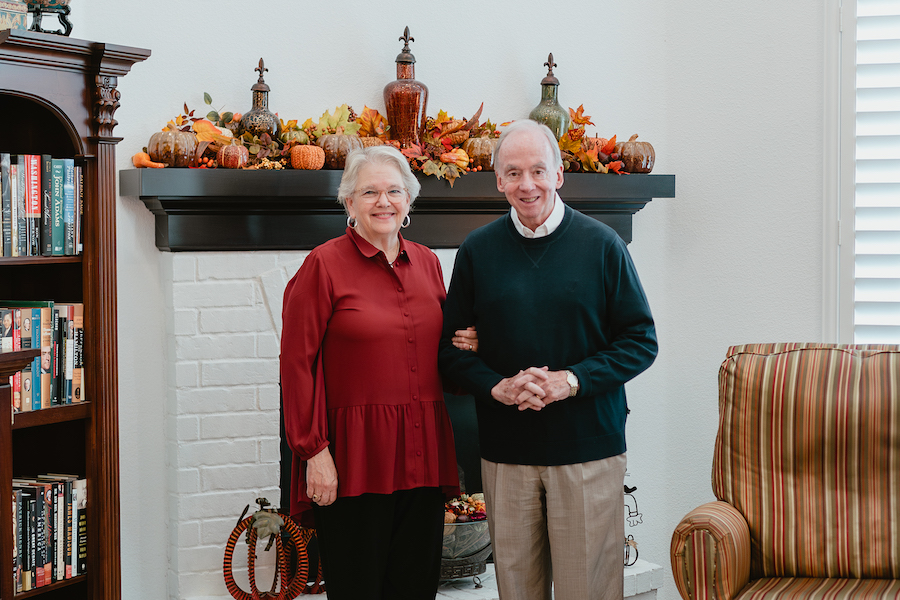
David S. Dockery, the tenth president of Southwestern Baptist Theological Seminary, and his wife, Lanese, have been married since 1975. Both are natives of Birmingham, Alabama, and grew up at Hunter Street Baptist Church in the central Alabama town.
His time at the University of Alabama would prove to be pivotal to several aspects of his future. Through leading a Bible study while a college student, Dockery met his wife, Lanese. Though a couple of grades ahead of her, Dockery and Lanese both grew up at Hunter Street Baptist Church in Birmingham.
Dockery explains at Hunter Street they knew of each other, but about the time they both would have been in youth choir, Dockery’s family changed churches to First Baptist Church of Birmingham.
However, as a freshman at Alabama Lanese was one of 15 college students from Hunter Street who attended the Bible study Dockery led in the A-Club Room on the university’s campus.
“I think one of the things that initially attracted me to him was his love for Scripture and his love for the Word, and I really trusted his walk with the Lord,” Lanese recalls, adding she “learned a lot in those Bible study experiences that we had together.” Throughout their nearly 50-year marriage, she has witnessed firsthand her husband’s “humility, and the way he cares for people, and he doesn’t lord it over his family or the teammates and team that he puts together. He listens well and is able to take difficult situations and simplify them.”
They were married in the summer of 1975.
In the summer of 1973, while studying for his undergraduate degree in education, with a minor in journalism, Dockery had the opportunity to attend the Institute for Biblical Studies in Chula Vista, Mexico, which he describes as “life-changing.” Influenced by a campus ministry, Dockery made a “renewed commitment of my faith in Christ,” as a sophomore, he explains. As a nine-year-old at Vacation Bible School, Dockery made what he describes as “a step toward God, a public profession of faith, and was baptized.”
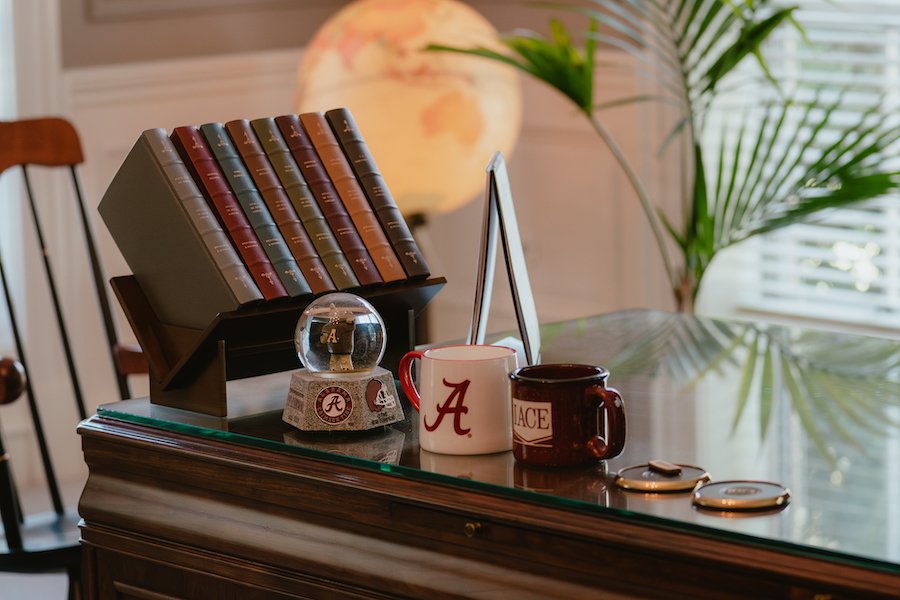
Dockery attended the University of Alabama on a full athletic scholarship as a student worker in the Crimson Tide’s athletic department. The opportunity allowed him to work with hall of fame coaches Paul “Bear” Bryant and C.M. Newton who led the university’s football and men’s basketball teams, respectively. Dockery learned lessons that helped shape how he leads teams.
Dockery grew up in a Christian home on Birmingham’s west side, “the working-class side of the city,” he describes, “and had a wonderful upbringing in so many ways.” Dockery’s father, Sam, was a deacon at their church and he recalls his dad “taught me how to work hard and taught me to respect others and to put God first in my life, too.” He explains that “from the earliest days,” his mother, Pansye, “was my Bible teacher.” He says his mother, “while not a theologian,” taught him Bible stories, and as he became involved in Bible drill, “she drilled me to make sure I knew those Bible verses and could find Habakkuk and 2 Peter and Jude and those hard-to-find books.” Dockery adds, “I owe her a lot.”
Building on the Christ-centered foundation his parents laid, the Lord used Dockery’s time in Mexico as he “learned to study the Bible systematically” and “took my first little doctrine and apologetics courses and fell in love with the idea of studying the Bible and studying theology.” Dockery returned home and “said to the Lord, ‘If I have the privilege to study Scriptures like this and teach them to others, this would be what I would love to do.’” He adds he “didn’t know what that meant” at the time and thought he would be a “youth minister teaching Bible” for high school seniors at a “private school or something.” Upon his return to the Alabama campus, Dockery began leading a Bible study in the athletic department and another smaller Bible study on campus.
“I was in love with the Scriptures,” Dockery says. “I had a Living Bible and a New American Standard Bible, and I would go back and forth, reading them and reading them, reading them, and begin to memorize them and just wanted to teach others what I was learning.”
Dockery was “surprised” in the spring of 1974 when Tommy Lea, pastor of Hunter Street Baptist Church who would later become the dean of the School of Theology at Southwestern, invited the young college student to begin serving as the minister of students at the Birmingham church.
“Having sensed a call to ministry following my summer at the Institute for Biblical Studies in Chula Vista, Mexico, in the summer of 1973, I viewed the invitation from Dr. Lea, which I did not seek or for which I did not apply, to be an open door from God,” Dockery explains.
He added while he was “truly grateful for the years of opportunities” in the Crimson Tide’s athletic department, he “had sensed that my future was going to be ministry focused rather than in athletics” and he “accepted the invitation from Dr. Lea and began serving at Hunter Street in the summer of 1974.”
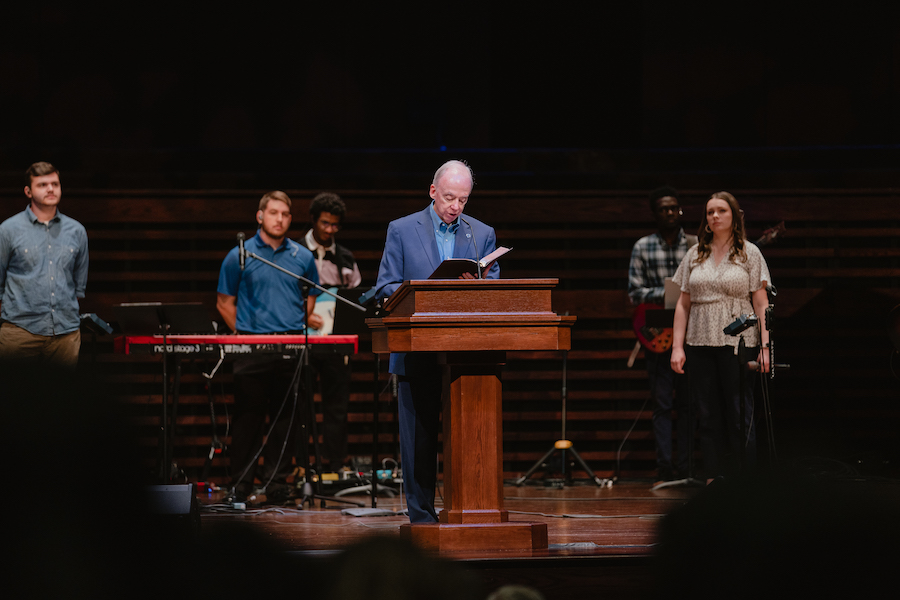
Dockery earned a Master of Divinity from Southwestern Seminary in 1981. He also holds degrees from the University of Alabama at Birmingham, Grace Theological Seminary, Texas Christian University, and the University of Texas system. His storied career in Christian higher education includes service at Criswell College in Dallas, Texas, the Southern Baptist Theological Seminary in Louisville, Kentucky, Union University in Jackson, Tennessee, and Trinity Evangelical Divinity School in Bannockburn, Illinois. Dockery began serving at Southwestern in 2019.
A week after his 1975 graduation from the University of Alabama at Birmingham, Dockery and Lanese were married. The couple soon relocated to Indiana so Dockery could begin a Master of Divinity degree at Grace Theological Seminary “to prepare for whatever God was going to do next,” he explains.
“At that time, I was scared to death of taking beginning Greek and beginning Hebrew,” Dockery remembers. “I didn’t think I could do those. I didn’t quite have the confidence at that time to even imagine doing anything but just learning how to study the Bible.” Lanese adds he took both biblical languages “at the same time.”
While in Indiana, Dockery was also the women’s basketball coach for the undergraduate team at Grace College. Following his 1979 graduation from the Winona Lake, Indiana-based school, the Dockerys relocated to Fort Worth so he could begin pursuing a Master of Divinity at Southwestern.
While in Fort Worth, the Dockerys’ three sons, Jonathan, Benjamin, and Timothy, were all born.
Dockery chose Southwestern due to “four influential pastors” during his childhood and adolescent years who were Southwestern grads, including Lea; the late Charles C. Bowels, who formerly served as president of the Southern Baptist Convention Pastors’ Conference; the late Darold H. Morgan, who would later serve as president of what was then known as the SBC Annuity Board; and the late James Landes, who would later serve as president of the Baptist General Convention of Texas.
“When I thought about the Baptist seminaries, Southwestern was the one that influenced me through Southwestern graduates,” Dockery explains.
Before completing his second master’s degree in 1981, Dockery says he “had some faculty members who encouraged me to do doctoral work” and “that’s when that seed was planted that ‘you perhaps should teach.’”
“In the back of my mind, I had hoped that maybe one day I could come back here, but that seemed like a far-fetched dream, frankly,” he remembers. “When I thought of Curtis Vaughan and James Leo Garrett and John Newport … no way I could think of myself in those kinds of categories.”

Dockery has authored or edited more than 40 books during his career. He is also the collector of baseball caps of Major League Baseball teams and identifies the Boston Red Sox and Chicago Cubs as his favorites.
Over the next four decades, after seeing God’s providence and leading through a Master of Arts in New Testament from Texas Christian University, a pastorate in Brooklyn, New York, a professorship at Criswell College in Dallas, a Doctor of Philosophy degree from the University of Texas system, serving as provost and dean of the School of Theology at Southern Baptist Theological Seminary in Louisville, Kentucky, a distinguished presidency of Union University in Jackson, Tennessee, that spanned almost two decades, and a presidency of Trinity Evangelical Divinity School in Bannockburn, Illinois, the Dockerys returned to Fort Worth in 2019 so he could begin serving as distinguished professor of theology and theologian-in-residence at his alma mater.
The Lord’s leadership and sovereignty would prove itself to Southwestern as Dockery was named interim provost in December 2020, a role he would hold for 14 months, until February 2022. Seven months later, Dockery was named interim president of the institution until he was elected president by the seminary’s trustees in April of this year, which was made retroactive to September 27, 2022.
Barbara McMillin, a recently elected Southwestern Seminary trustee, is president of Blue Mountain Christian University in Blue Mountain, Mississippi. Before assuming the leadership role at the north Mississippi institution in 2012, McMillin served as associate provost and dean of the College of Arts and Sciences at Union University. Her time at the Tennessee-based school overlapped with Dockery’s presidency by 16 years.
McMillin explains that Dockery is a “humble, prepared, visionary, godly leader and each of those adjectives has a lesson that goes with it.” She adds while at Union “he consistently led in ways that are God-honoring.”
“He consistently presents in a genuine way his humble approach to leadership,” McMillin says. “He is a man who gives incredible prayer time to the steps that need to be taken and he encourages others to do the same.”
McMillin describes Dockery as a “person of vision” adding that “many people, I think, might be able to cast a vision, not everyone can communicate it effectively as David Dockery.”
McMillin explains Dockery is “tireless,” humble, and is a leader who “listens,” and is both attentive and supportive.
“I think he looks for ways to help people to grow,” McMillin explains, adding she believes “he knows how to put together a team of people who have a host of gifts and then see how those gifts are best utilized when they are employed in conjunction with other people’s gifts.” She notes that “people tend to perform more effectively when they are in partnership with other people who have been empowered to use their gifts.”

Throughout his ministry in Christian higher education, Dockery has had the opportunity to meet and interact with notable people, including the late Margaret Thatcher, who served as Prime Minister of the United Kingdom from 1979 to 1990.
Dockery’s own leadership philosophy was shaped, in part, by sports. While working in the Alabama athletic department, Dockery had the opportunity to work with legendary Crimson Tide football coach Paul “Bear” Bryant and men’s basketball coach C.M. Newton. While both coaches would be elected to the hall of fames for their respective sports, as a college student Dockery learned lessons that would impact how he leads – or coaches –people on his teams.
“Coach Bryant was authoritarian, strong, [and] people feared him,” Dockery recalls. “Coach Newton: people loved him. He invested in people. The person who sat on the end of the bench was just as important for him as the star player.” Dockery adds Newton was a person of character and faith, and he “admired him greatly.”
There were Southern Baptist leaders who also taught Dockery about leadership, including W.A. Criswell and Herschel Hobbs, and other ministry leaders, such as Chuck Colson and Carl Henry, as well. “It’s kind of a confluence of all of them that has shaped my understanding of leadership,” he says.
As Dockery leads it is with the philosophy that, “Everyone has something to offer and if you can invest in them and help them become the best” then they can “live their calling the best they can.” He looks for his team member’s “sweet spots” and “how their gifts can be matched to the right place.”
“I think part of leadership is not just giving ideas and coordinating things, but investing in people and helping people learn to think about their own calling, and how they can maximize their gifts at a particular season in life and be prepared for whatever might come next,” he notes. “But it’s God’s kindness that has allowed that to happen. I can’t take credit for any of it.”
Dockery’s leadership style has been one that has benefited his pastor, Chris Wright, who serves at South Hills Baptist Church in Fort Worth and is a Doctor of Educational Ministries student at Southwestern. Wright says Dockery does not want “attention or accolades” but has been a “quiet encourager.”
“Anytime there’s a guest speaker or some kind of special testimony or camp report, he’s individually reaching out to those church members or to that guest or fellow staff member who happened to be preaching that day, and encouraging them, lending his support to them however he can,” Wright explains. He adds when he has a question or needs leadership advice or wisdom, Wright can contact Dockery who will “help give me clarity on something I’m trying to figure out.”
Dockery has used the same approach at Southwestern Seminary – long before assuming the role of president. As he now leads the 115-year-old institution, it is with the self-label of “reluctant president.”
“There’s one of C.S. Lewis’s biographies, it’s called The Reluctant Convert and I think I’m the ‘reluctant president,’” he explains. “I didn’t really want to do this, but I felt the seminary was in a very difficult time and I wanted to help. I love Southwestern Seminary. It had a life-changing effect upon me and I wanted to give something back to the seminary. And I think it’s out of that love for the Southwestern heritage that I did so as well as the fact that I love this faculty and wanted to try to help them in a difficult time.”
Yet, true to his character of humility, Dockery concludes, “I want to help for as long as I can. If my prior experience can be beneficial to Southwestern during this short time, then I’m happy to try and if it’s not, I’m happy to step aside and let somebody else try, but I’ll do what I can and trust the Lord’s kind providence to show His favor to this institution once again. And we pray that will be the case.”
Ashley Allen (‘03, ‘09) is managing editor of Southwestern News.
*Some photos for this article were provided by the Dockery Family and Union University.
